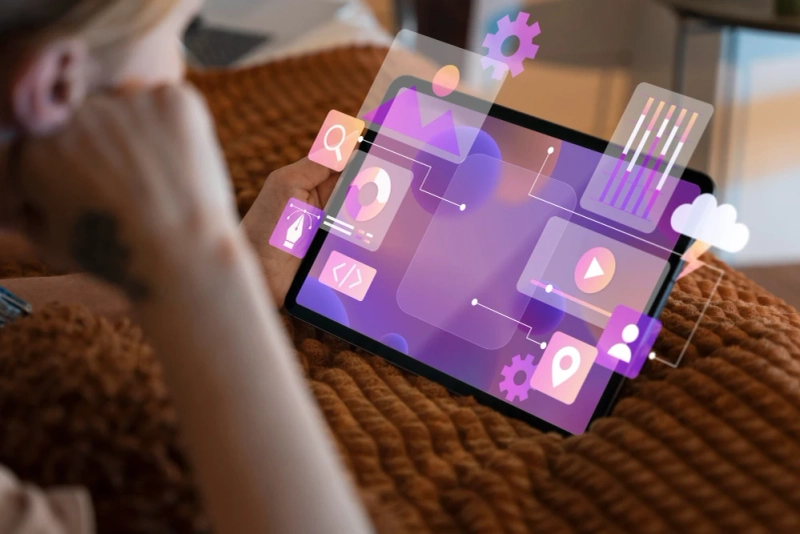In 2025, Artificial Intelligence (AI) and Machine Learning (ML) are no longer futuristic concepts—they’re foundational technologies driving how mobile apps interact with users. From predictive personalization to real-time decision-making, AI and ML are redefining mobile app user experience (UX) across industries.
In this article, we explore how mobile app developers and engineers reshaping this new possibility in a way that never happened before!
What Are AI and Machine Learning?
- Artificial Intelligence (AI) is the broader concept of machines being able to carry out tasks in a way that we would consider “smart.”
- Machine Learning (ML) is a subset of AI that involves training algorithms to learn from data and make predictions or decisions without being explicitly programmed.
In mobile apps, AI and ML enable applications to adapt, predict, automate, and improve over time — all based on user behavior, preferences, and environmental inputs.
Key Benefits of AI and ML in Mobile Apps
1. Hyper-Personalized Experiences
AI helps apps analyze user behavior, preferences, and usage patterns to deliver highly personalized content — whether it’s product recommendations, news feeds, or learning paths.
Example:
E-commerce apps show tailored product suggestions. Streaming apps recommend content based on past viewing habits. Since it is a customizable feature check with developing agency for clear idea on how you can utilize this feature.
2. Smart Voice and Chat Interfaces
Voice recognition and natural language processing (NLP) allow apps to support conversational interfaces like chatbots and voice assistants.
Example:
Banking apps use AI chatbots for 24/7 customer service. Smart home apps use voice commands to control devices.
3. Image and Facial Recognition
AI can identify objects, people, text, or facial features within images or live video. This is used in everything from security to social filters.
Example:
Photo editing apps apply AI-based effects. Health apps use image recognition to analyze skin conditions.
4. Real-Time Translations and Speech Recognition
Machine learning enables apps to perform real-time language translations or transcribe speech with high accuracy.
Example:
Travel apps offer instant spoken translations. Education apps provide speech-based learning feedback.
5. Predictive Analytics and Behavioral Insights
Apps use ML to predict user actions — like when they’re likely to reorder a product, abandon a cart, or need customer support.
Example:
Fitness apps predict workout routines based on past sessions. Finance apps alert users about unusual spending behavior.
AI-Powered Features to Consider in App Development
If you're building or upgrading a mobile app in 2025, keep this checklist to discuss with your mobile app developing team.
- Recommendation engines (e.g., shopping, videos, news)
- Voice-based search and commands
- Smart chatbots for customer support
- Image scanning and recognition
- Automated fraud detection (for fintech and e-commerce)
- Emotion detection for user feedback analysis
- Personal health tracking and diagnostics (for health apps)
Tools and Frameworks Used in AI/ML App Development
Modern mobile developers rely on powerful tools to bring AI into apps:
- TensorFlow Lite – Google's lightweight ML framework for mobile
- Core ML – Apple's framework for on-device ML
- ML Kit by Firebase – Offers ready-to-use APIs for text recognition, face detection, etc.
- OpenAI APIs – Power intelligent chat, summarization, and decision-making
- PyTorch Mobile – Flexible ML deployment on mobile devices
On-Device AI vs. Cloud-Based AI
With increasing concerns over data privacy and latency, on-device AI is becoming more common.
- On-Device AI: Faster, works offline, enhances privacy
- Cloud-Based AI: More powerful for complex tasks, requires internet
Best Practice: Use hybrid models where real-time tasks happen on-device and heavy processing is done in the cloud.
Industries Leading the Way
🔹 E-commerce:
AI suggests products, predicts buying behavior, and powers visual search.
🔹 Healthcare:
ML models analyze symptoms, monitor health vitals, and personalize treatment plans.
🔹 Finance:
AI automates budgeting, detects fraud, and offers investment insights.
🔹 Education:
Smart learning apps adapt to student pace, highlight weak areas, and use voice feedback.
🔹 Travel & Hospitality:
AI-based virtual assistants help users with bookings, translation, and personalized itineraries.
Challenges to Watch Out For
While AI brings massive potential, developers should be mindful of:
- Bias in training data
- Security and privacy concerns
- Resource consumption on low-end devices
- User consent and ethical AI use
Investing in responsible AI development and transparent data practices is essential to gaining user trust.
Final Thoughts
AI and machine learning are transforming mobile app experiences from passive tools into intelligent companions. As user expectations evolve in 2025, apps that anticipate needs, personalize content, and automate routine tasks will dominate the market.
If you're planning a new app or scaling an existing one, incorporating AI is not just a trend — it's a competitive necessity.



